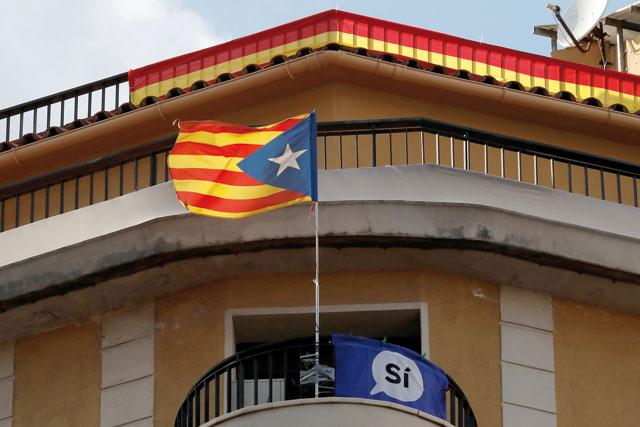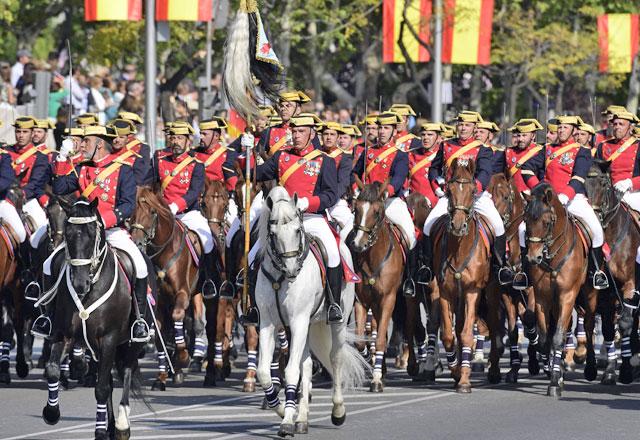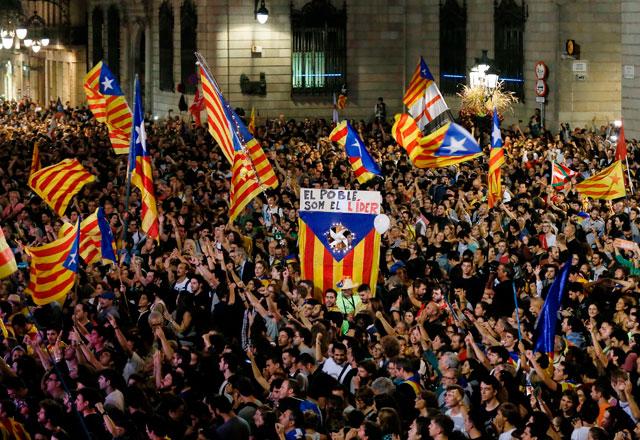You are here
Madrid moves towards direct rule over Catalonia
By Thomson Reuters Foundation - Oct 16,2017 - Last updated at Oct 16,2017

An Estelada (Catalan separatist flag) banner that reads ‘Yes’, and a Spanish flag hang from balconies in Barcelona, Spain, on Saturday (Reuters photo)
MADRID/BARCELONA — Catalan authorities must drop a bid for independence by Thursday, the Spanish government said, moving closer to imposing direct rule over the region after its leader missed an initial deadline to back down.
In a confrontation viewed with mounting unease in European capitals and markets, Carles Puigdemont failed on Monday to respond to an ultimatum from Madrid to clarify if he had declared independence. A regional broadcaster said he also plans to ignore a second deadline on Thursday.
Plunging Spain into its worst political crisis since an attempted military coup in 1981, Catalan voters backed a breakaway in a referendum on October 1 that Spain's Constitutional Court said was illegal.
On that basis, Puigdemont made and then suspended a symbolic declaration of independence last Tuesday, calling for negotiations on the region's future.
Madrid had given him until 10:00am (0800 GMT) to clarify his position on independence with a "Yes" or "No", and until Thursday to change his mind if he insisted on a split — saying it would suspend Catalonia's autonomy if he chose secession.
Deputy Prime Minister Soraya Saenz de Santamaria said he had not answered the question and had to do so by Thursday. "Mr Puigdemont ...must answer 'yes' or 'no' to the declaration," she said.
Catalan broadcaster TV3 cited unnamed sources as saying Puigdemont did not intend to respond on Thursday, but would maintain an offer of dialogue. A Catalan government spokesman could not confirm the report.
In a letter to Spanish Prime Minister Mariano Rajoy made public on Monday, Puigdemont did not directly answer on the independence issue, instead making a "sincere and honest" offer for dialogue between the two men over the next two months.
In reply, Rajoy said Puigdemont's stance had brought Madrid closer to triggering Article 155 of the constitution, under which it can impose direct rule on any of the country's 17 autonomous communities if they break the law.
Also suggesting Puigdemont and his team were in no mood to follow Rajoy's game plan, Catalan interior chief Joaquim Forn said Article 155 would not allow Madrid to remove members of the Catalan government.
Broader secessionist concerns?
The Catalan government says 90 per cent of voters in the referendum backed a breakaway, but turnout was only 43 per cent as most opponents of independence in the region boycotted it.
While that points to a lukewarm endorsement of Puigdemont's intentions, EU authorities remain concerned that the test of strength between Madrid and Barcelona might impel moves towards secession elsewhere in the bloc.
European Commission President Jean Claude Juncker said on Friday that Catalan independence would encourage other regions to follow suit, potentially making the European Union ungovernable.
With some of the region's largest companies having already shifted their head offices elsewhere and others undertaking to follow if Puigdemont declares independence, investors believe a political split could undermine Spain's economic rebound.
As Spanish bonds and stocks sold off on Monday, major Cava producer Codorniu Raventos added its name to the list, saying it had moved from Barcelona to Spain's La Rioja region due to "legal and political uncertainty".
The terms of Article 155 on direct rule, which has never been applied, are vague.
It says that when a region does not meet its constitutional obligations or other laws, or goes against the general interest, the government "can adopt any measure needed to force those obligations to be met" once receiving approval from Spain's lower house.
The article's wording suggests that would include anything from taking control of regional police and finances to installing a new governing team or calling a snap election.
A legal source said state prosecutors had asked for Catalan police chief Josep Lluis Trapero to be detained in prison pending questioning over whether his force deliberately failed to enforce the court's referendum ban.
A judge would rule on the request later on Monday, the source said.
Trapero was put under formal investigation for sedition after failing to order the Mossos d'Esquadra to rescue Civil Guard police who were trapped inside a Catalan government building in Barcelona by tens of thousands of pro-independence protesters.
The heads of civic groups Asamblea Nacional Catalana and Omnium will also testify over their role in organising those protests.
Related Articles
MADRID — Spain celebrated its national day Thursday with a show of unity in the face of Catalan independence efforts, a day after the centra
MADRID/BARCELONA — Sacked Catalonian president Carles Puigdemont on Saturday called for peaceful "democratic opposition" to the central gove
MADRID — Catalonia’s deposed leader Carles Puigdemont urged the region’s political forces on Tuesday to unite against Spain, as a window for















